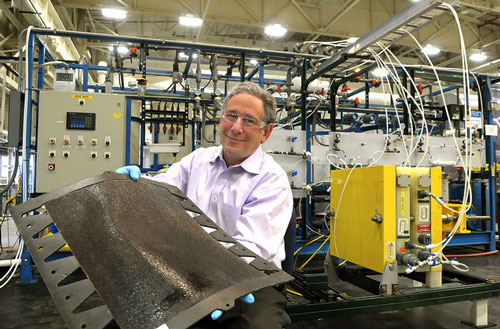| Mar 18, 2011 |
Electrodeionization technology to reduce cost to process biomass-based chemicals, fuels and treat water
|
|
(Nanowerk News) Argonne National Laboratory and Nalco Company, with headquarters in Naperville, Ill., have reached a licensing agreement for an electrodeionization technology that will help significantly reduce the cost of producing clean energy and of the chemicals and water used in industry. The separations technology can process biomass-based feedstocks into biofuels and chemicals.
|
|
Specifically, Argonne's patented technology allows for the deionizing or the continuous removal of charged products like organic acids from aqueous streams and eliminates the requirement to continuously add neutralizing agents. Conventional bioprocessing technologies require significant capital expenditures on energy-intensive steps to recover these products and generate large waste streams.
|
 |
| Argonne's patented technology allows for the continuous removal of charged products like organic acids from aqueous streams and eliminates the requirement to continuously add neutralizing agents.
|
|
Industrial acceptance of bioprocessing is on the rise as the economy shifts from oil and natural gas to clean biomass feedstocks. As a result, controlling the processing costs is critical to the commercial success and growth of these products, especially if they are to be competitive with petroleum-based products.
|
|
Argonne's resin wafer technology is made from commercially available materials. But by controlling dimensions, composition, porosity and conductivity, the resin wafer technology can be easily adapted to a target product. Moreover, researchers integrated bioconversion capabilities into the electrodeionization platform, which used electricity to capture very dilute charged products from the process stream.
|
|
"The implications of this resin wafer electrodeionization technology are both positive and exciting," said Argonne biochemical engineer Seth Snyder, whose group developed the technology. "Bio-based chemicals and fuels are a clean and sustainable alternative to oil and gas consumption. Increasing their usage would help provide a home grown energy source, reduce carbon dioxide emissions, as well as overall energy costs. Our technology could help make affordable clean and bio-based products that are not currently economically competitive."
|
|
With the license in place, Nalco and Argonne will design and develop platforms to help customers integrate the clean technology into their manufacturing processes.
|
|
"Nalco is constantly seeking partnerships like the one we share with Argonne," said Manian Ramesh, Nalco's Chief Technology Officer. "Working with national laboratories, universities, suppliers and customers around the world combines the extensive intellectual talent available outside Nalco with the hundreds of researchers at our global R&D centers. This open innovation develops technologies that help customers reduce their operating expenses, increase productivity and minimize environmental impacts. That helps us provide them an environmental return on investment, what we call eROI."
|
|
Funding for this technology was provided by DOE's offices of Fossil Energy, Biomass and Industrial Technologies.
|

